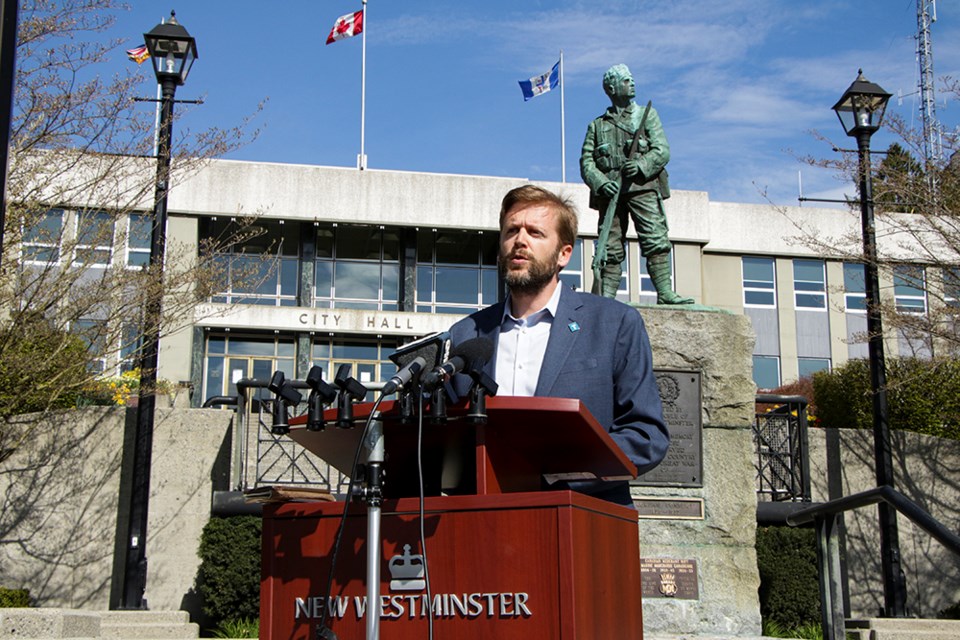New Westminster Mayor Jonathan Cote is appealing to the federal government for financial support for transit services in Metro Vancouver.
Cote, chair of the Mayors’ Council on Regional Transportation, was among the officials from a variety of organizations from across Canada who appeared before the federal finance committee via his computer on Friday.
“I really appreciate the opportunity to come to this community to hopefully implore the federal government to see how it can play a partnering role to help support a viable transit service, not only during the crisis but also as we emerge from the crisis,” he said. “Other countries around the world have already recognized that transit service is important, both at this time and during the recovery, and have developed emergency-relief programs.”
Cote said the challenges TransLink is facing in delivering public transit are being faced by major transit agencies all across the country, so it’s really a national issue.
“Here at TransLink, our major revenue source is transit fares,” he told the panel. “With transit ridership down 80%, our organization is losing $75 million a month. This is certainly not sustainable and is creating tremendous pressure on our transportation agency.”
Although TransLink has seen significant declines in transit ridership during the COVID-19 crisis, Cote said 75,000 Metro Vancouver residents are still very dependent on the transit system.
“Our surveys have indicated that nine in 10 trips on our transit system today are related to essential service, whether that’s working in a grocery store, going to a grocery store or to do with health care,” he said. “Our service is still providing valuable essential service and essential transportation options – 150,000 households in Metro Vancouver also do not own a car, so there are many folks in our region who do not have alternative transportation options.”
Cote said TransLink has already made the difficult decision to cut transit service by approximately 40%, but it estimates it will still be losing $40 to $50 million a month because of the revenue shortfalls caused by the crisis.
“If, over the next few months, we are unable to get provincial and federal support and continue to lose revenue that we anticipate, even with the cuts, we will have to be looking at the really difficult discussion about cutting transit service even more,” he said. “This is going to be very odd to the general public; as we move out of the health crisis and move into the economic recovery, we are going to be having a failing transportation system that is going to provide less and less mobility options – at the exact time people need more and more options. I think we are dealing with an immediate financial crisis but also longer-term issues.”
According to Cote, TransLink is estimating it will have a revenue deficit in the range of $450 to $700 million this year.
“Currently we are using reserves to be able to help support the losses, but these are reserves that were put in place to help maintain and build our transit system. Those reserves will be fully depleted by later fall and into the end of the year,” he said. “I think that certainly highlights the urgency we face.”
New Westminster-Burnaby MP Peter Julian, who is the NDP’s finance critic and a member of the committee, invited Cote and Burnaby Mayor Mike Hurley to be witnesses to the finance committee and outline some of the impacts of COVID-19.
Hurley was among the officials who spoke about the urgent need for federal support for local governments. He said the City of Burnaby had to lay off 1,500 employees but would be able to put some of those people back to work if the federal government extended the emergency wage subsidy program to municipalities.
“For us right now, what’s needed immediately is for our vulnerable populations and our homeless populations – we are not getting any support from the federal government. Although we hear that there is support out there, we haven’t been actually seeing any of it brought our way,” he said. “Our vulnerable population is exploding, both the homeless situation and those in danger of becoming homeless. We alone will not be able to carry the burden of looking after those people for a long period of time. So we really need the federal government and the provincial government to come forward and assist us in providing the much-needed help for those populations. That would be the immediate ask outside of the wage subsidy.”



